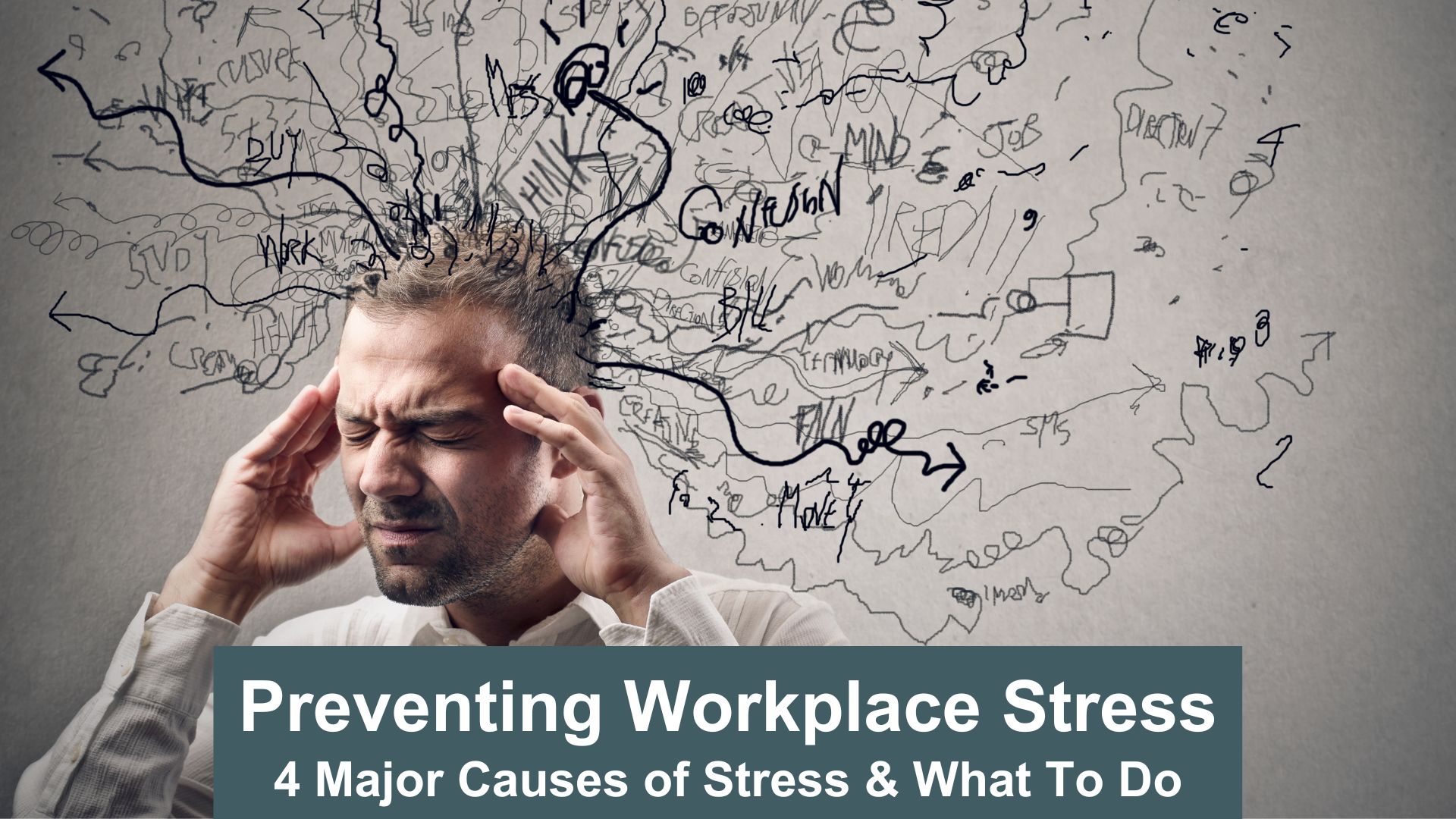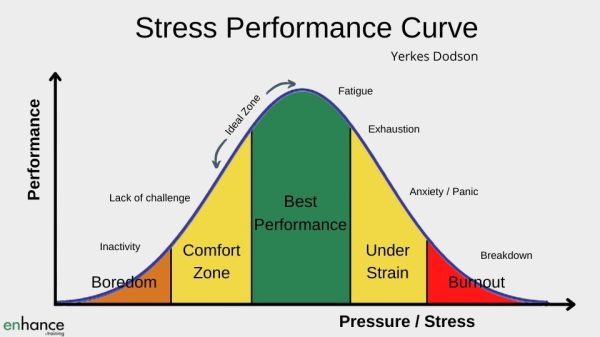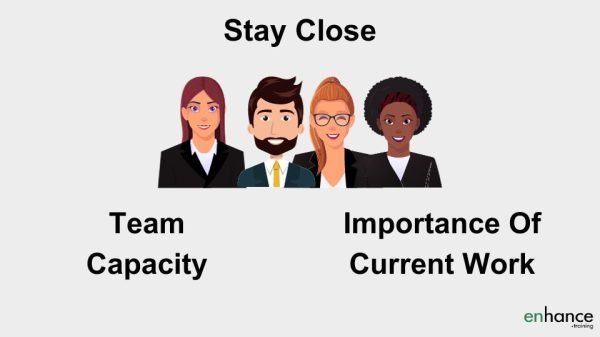Preventing Workplace Stress – 4 Major Causes of Stress & What To Do

Preventing workplace stress is in everyone’s interests. Per AXA insurance company, work-related stress costs the UK economy £28bn per year with around 23.3m sick days taken. If you or your team members are not at work, you or they can’t contribute to the company’s success.
A certain level of stress is good for productivity as it motivates us to be better and deliver more. Some stress is good. Once you go past an okay level of stress, mental and physical health problems develop over time. Without good health, so many aspects of your life are limited. Keeping your stress levels at or below an okay level for you and your team, means more time at work and more capacity to do great work as well as having a much more enjoyable time at work.
These 4 big causes of stress in the workplace are worth learning how to avoid or at least reduce, for you personally and for your team members.
I will be explaining why each is a big cause of stress at work and how to deal with stress at work caused by each of these as an individual. I also provide suggestions for managers to reduce the impact of stress on your team caused by each of these.
Preventing Workplace Stress – 4 Major Causes of Stress & What To Do
- Being poor at saying no
- Having a difficult relationship with your boss or colleagues
- Not getting support and help to do your job well
- Suffering organisational conflicts
Watch on YouTube
Listen on Podcast
Being Poor At Saying No – One of the biggest causes of stress at work
Being overworked, or unable to complete all the work you have agreed to do is stressful. No-one wants to be always working late or letting colleagues and bosses down. Neither are good for us personally, the teams we work in and ultimately our companies.
When you are poor at saying no, you are going to be overworked. It is that simple. All companies I have worked have more work to do than people available to do it. How to handle stress at work effectively, starts with getting better at diplomatically saying no.
Becoming good at saying no starts with being clear what is important to the team, your boss, and the company. Prioritise saying yes to the important work, and practice saying no to as much of the unimportant work as practical.
Company strategy and functional and team objectives are both good places to start to work out what is important. Next, ask your boss “What are the top 5 areas you need me to focus on over the next month?” Keep asking until you get specific answers which ideally aligns with strategy and your team objectives. Keep your focus on 5 areas or less. Pay attention to what your boss focuses on, what they ask questions about and demonstrate interest in.
Saying no is so useful in how to deal with stress at work.
How you say no is important
Always provide the reason why you can’t do something you are being asked and ensure the why is clearly business related and not personal. An example might be “I am very sorry, I can’t add that to my list right now as I have 5 other deadlines which I believe are more important and these are …”
As a manager, it is just as important for you to say no on behalf of your team as it is being good at saying no for yourself personally. Stay close enough to your team that you know and understand how much spare capacity they have at any time and how important what they are currently working on is. Both actions are vital in judging when to say no and how to say no on behalf of your team.
Being good at saying no diplomatically is one of the best ways for how to manage stress at work.

The second major cause of stress at work is Having a difficult relationship with your boss or colleagues
Your relationship with your boss is the most important relationship you have at work because of the daily influence they have on what you work on and how your career progresses. Have a difficult relationship with your boss and your stress levels will be a lot higher and dealing with stress at work a lot harder.
Reduce your stress at work by proactively managing your relationship with your boss.
Be Proactive
Even if they are a nightmare boss, the following actions will help improve your relationship:
- Work out how you can help your boss. This starts with your mindset. Then actively seek out what they are focused on, stressing about, or struggling with and work out how you can help them, even if it is just a small bit of help.
- Focus as much of your work as possible on areas that best help your boss meet their personal and team objectives. Speak to your boss and find out what they really want you to work on.
- Train yourself to actively look for areas that you admire about your boss. No matter how horrible they are, they will have good points. Find them, focus on these areas and compliment them for what they do well. Be genuine and honest rather than trying to suck up.
- Work on finding out your boss’s interests and passions and get them talking about them. Do some research so you can contribute to the conversation, even if it is just demonstrating a desire to learn more.
- Be a good team player and help the team do better in any way you sensibly can. Every boss likes team players who are trying to push team members to hit team goals.
A great way to reduce stress at work is to work on improving your relationship with your boss. Many of the approaches we have been through work equally well for improving relationships with colleagues.
Work consistently and expect the improvements in relationships to take a little bit of time.

The third big cause of workplace stress is Not getting support and help to do your job well
I have worked in a sink or swim environment, and I know how stressful it can be trying to deliver on your job without very much support or help. Getting support and help to do your job well comes in many forms including:
- Understanding what exactly is expected of you and having clear direction.
- Having clear job responsibilities and boundaries
- Being protected from interdepartmental politics and the manoeuvring of those more senior than you
- Getting helpful and considered answers to questions you have.
- Being listened to and actions taken to sort out problems you are experiencing.
- Working in team in which the team members help each other out and work together towards common goals
- Being coached through dealing with the many people challenges that all managers face
- Being given the right resources at the right time
Trial & Error Takes a Lot Of Time
Trying to learn and do your job well by trial and error takes a lot of time, is stressful and usually gets you to okay rather than great.
There are lots of sources of help outside the traditional route of speaking to your manager which covers much of the list we have just gone through, such as books, courses, mentors and coaches.
You are can also help yourself. For example, you could write you own job description and agree it with your manager. You could set your own objectives, aligned with team or functional goals and agree them with you manager and so on.
Proactively take steps to get help from any areas inside and outside of work. Yes, your company should be helping you, but if they aren’t, why go through all the stress of not getting help from elsewhere.
When you are managing a team, try to provide as much support and help to your team members as proactively as possible. They will experience a lot less stress and be able to handle stress at work much better.

The fourth major cause of stress at work is Suffering organisational conflicts
Organisational conflicts are fairly common. A classic example of organisation conflict could be the sales team targeted with increasing sales and the finance team target with increasing profit. With very different goals, the two teams are going to experience conflict with each other. How to manage stress at work in this situation might be to task both teams to work together to grow gross profit.
Differences in goals at team, functional and business unit level create conflicts. For managers, the best way to reduce conflict is to work on creating more aligned goals. The stress levels will drop and team working will increase, which will increase performance. Alignment of goals within a business reduces conflicts and stress and increases effectiveness of teams.
Competition for the limited resources of a business inevitably creates conflict and stress at work. Managers are best placed to negotiate on behalf of their teams and should focus on what use of resources is best to reach business goals.
Different processes create conflicts and stress at work when they are not aligned to goals or seek to achieve conflicting results. An example might be processes and systems to standardise contractual terms so that the business can scale more easily conflicting with sales team processes to promote contract flexibility which helps drive higher sales.
When you spot organisational conflicts or are on the receiving end of conflicts, either negotiate changes to the source of the conflict or highlight to your boss the conflicts. Explain why they are happening. Ask your boss to take action to minimise the conflict. This will reduce the workplace stress experienced by everyone.
Managers should look out for organisational conflicts and minimise the workplace stress caused – by changing or minimising the cause of the conflict wherever possible.

in summary
There are lots of reasons that workplace stress arises. How to deal with stress at work is important particularly when it is outside of your personal control.
Practice saying no on your own behalf and then on your team’s behalf. Say no diplomatically and always provide the business reasons why you are saying no.
Take proactive steps to improve the relationship with your boss and your colleagues. There is a lot of actions you can take that will make a big difference quickly. Improve these relationships and you will have a lot less stress at work.
When dealing with stress at work, think about what help and support you need and how you might get help earlier when stress levels are low rather than later when the stress levels have got too high.
Finally, look out for organisational conflicts which are causing workplace stress for multiple people or teams. Change the causes of stress at work by minimising or removing the conflicts.
If you have any questions on “Preventing Workplace Stress – 4 Major Causes of Stress & What To Do”, please email me at support@enhance.training and I will get back to you.
Suffering too much stress at work is not pleasant. I personally once got to the stage of having panic attacks because of the pressure I was under at work. Taking steps to reduce your workplace stress may not always be easy yet if you don’t, you end up being unhappy at work. Worst case you might develop mental and physical health problems if the stress levels stay too high for too long.
Take action to learn the skills that will have a massive impact on the stress you are under at work!






